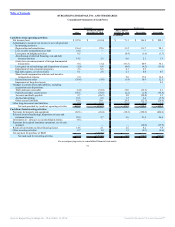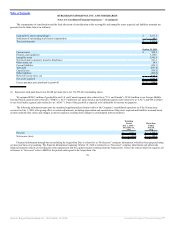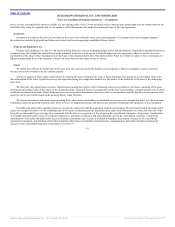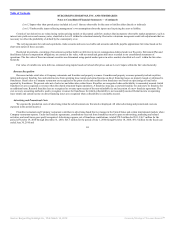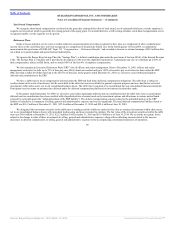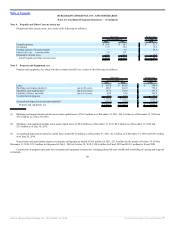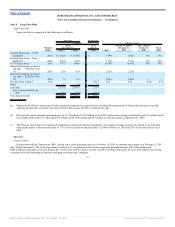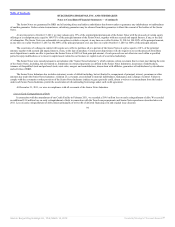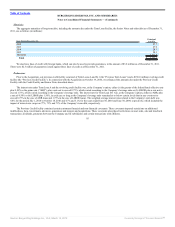Burger King 2011 Annual Report Download - page 86
Download and view the complete annual report
Please find page 86 of the 2011 Burger King annual report below. You can navigate through the pages in the report by either clicking on the pages listed below, or by using the keyword search tool below to find specific information within the annual report.
Table of Contents
BURGER KING HOLDINGS, INC. AND SUBSIDIARIES
Notes to Consolidated Financial Statements — (Continued)
$93.3 million for the year ended June 30, 2009, and is included in selling, general and administrative expenses in the accompanying consolidated statements of
operations.
To the extent that contributions received exceed advertising and promotional expenditures, the excess contributions are accounted for as a deferred liability
and are recorded in accrued advertising in the accompanying consolidated balance sheets.
Franchisees in markets where no Company restaurants operate contribute to advertising funds that are not managed by us. Such contributions and related
fund expenditures are not reflected in our results of operations or financial position.
Litigation accruals
From time to time, we are subject to proceedings, lawsuits and other claims related to competitors, customers, employees, franchisees, government
agencies and suppliers. We are required to assess the likelihood of any adverse judgments or outcomes to these matters as well as potential ranges of probable
losses. A determination of the amount of accrual required, if any, for these contingencies is made after careful analysis of each matter. The required accrual may
change in the future due to new developments in settlement strategy in dealing with these matters.
Income Taxes
We file a consolidated U.S. Federal income tax return with Burger King Worldwide Holdings, Inc. The income tax provision for the Successor has been
calculated as though we file a separate return. The Predecessor filed a consolidated U.S. Federal income tax return.
Amounts in the financial statements related to income taxes are calculated using the principles of FASB ASC Topic 740, “Income Taxes.” Under these
principles, deferred tax assets and liabilities reflect the impact of temporary differences between the amounts of assets and liabilities recognized for financial
reporting purposes and the amounts recognized for tax purposes, as well as tax credit carryforwards and loss carryforwards. These deferred taxes are measured by
applying currently enacted tax rates. A deferred tax asset is recognized when it is considered more likely than not to be realized. The effects of changes in tax
rates on deferred tax assets and liabilities are recognized in income in the year in which the law is enacted. A valuation allowance reduces deferred tax assets
when it is more likely than not that some portion or all of the deferred tax assets will not be recognized.
Income tax benefits credited to stockholders’ equity relate to tax benefits associated with amounts that are deductible for income tax purposes but do not
affect earnings. These benefits are principally generated from employee exercises of nonqualified stock options and settlement of restricted stock awards.
We recognize positions taken or expected to be taken in a tax return, in the financial statements when it is more likely than not (i.e., a likelihood of more
than fifty percent) that the position would be sustained upon examination by tax authorities. A recognized tax position is then measured at the largest amount of
benefit with greater than fifty percent likelihood of being realized upon ultimate settlement.
Transaction gains and losses resulting from the remeasurement of foreign deferred tax assets or liabilities are classified as other operating (income)
expense, net in the consolidated statements of operations.
85
Source: Burger King Holdings Inc, 10-K, March 14, 2012 Powered by Morningstar® Document Research℠


